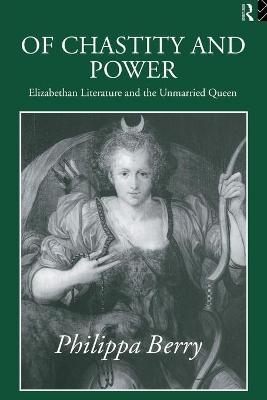
Of Chastity and Power
Elizabethan Literature and the Unmarried Queen
Seiten
1994
Routledge (Verlag)
978-0-415-05672-4 (ISBN)
Routledge (Verlag)
978-0-415-05672-4 (ISBN)
- Lieferbar (Termin unbekannt)
- Versandkostenfrei innerhalb Deutschlands
- Auch auf Rechnung
- Verfügbarkeit in der Filiale vor Ort prüfen
- Artikel merken
Through a reading of the texts of Lyly, Raleigh, Chapman, Spenser and Shakespeare, Berry explores the themes of sexuality and politics, classical myth and Neopatonic mysticism which became associated with Elizabeth I.
Elizabeth I was one of the most powerful women rulers in European history. What can feminism reveal about the attitudes of her male subjects towards this enigmatic figure?
Through readings of key Elizabethan texts by Lyly, Ralegh, Chapman, Shakespeare, and Spenser, Philippa Berry shows that while Elizabeth's combination of chastity with political and religious power was repeatedly idealized, it was also perceived as extremely disturbing. The figure of the unmarried queen implicitly challenged the masculine focus of Renaissance discourses of love, philosophy and absolutist political ideology.
In her exploration of the potent combination of themes of sexuality and politics with classical myth and Neoplatonic mysticism, Berry offers a radical reassessment of the status of `woman' as a bearer of meaning within Renaissance literature and culture.
Elizabeth I was one of the most powerful women rulers in European history. What can feminism reveal about the attitudes of her male subjects towards this enigmatic figure?
Through readings of key Elizabethan texts by Lyly, Ralegh, Chapman, Shakespeare, and Spenser, Philippa Berry shows that while Elizabeth's combination of chastity with political and religious power was repeatedly idealized, it was also perceived as extremely disturbing. The figure of the unmarried queen implicitly challenged the masculine focus of Renaissance discourses of love, philosophy and absolutist political ideology.
In her exploration of the potent combination of themes of sexuality and politics with classical myth and Neoplatonic mysticism, Berry offers a radical reassessment of the status of `woman' as a bearer of meaning within Renaissance literature and culture.
Philippa Berry
Introduction 1 Mirrors of masculinity: Renaissance speculations through the feminine and their genealogy 2 A curious conjunction: discourses of love and political power in the French Renaissance 3 Three-personed queen: the courtly cult of Elizabeth I and its Subjects 4 Carnival at court: contests for authority in Elizabethan aristocratic pastimes 5 Chastity and the power of interior spaces: Lyly’s alternative view of Elizabethan courtiership 6 Rewriting chastity: representations of the unmarried queen by Chapman, Shakespeare, Ralegh, and Spenser
| Erscheint lt. Verlag | 6.10.1994 |
|---|---|
| Verlagsort | London |
| Sprache | englisch |
| Maße | 156 x 234 mm |
| Gewicht | 400 g |
| Themenwelt | Geisteswissenschaften ► Geschichte ► Hilfswissenschaften |
| Geisteswissenschaften ► Sprach- / Literaturwissenschaft ► Anglistik / Amerikanistik | |
| Geisteswissenschaften ► Sprach- / Literaturwissenschaft ► Literaturwissenschaft | |
| Sozialwissenschaften ► Politik / Verwaltung ► Politische Theorie | |
| Sozialwissenschaften ► Soziologie | |
| ISBN-10 | 0-415-05672-1 / 0415056721 |
| ISBN-13 | 978-0-415-05672-4 / 9780415056724 |
| Zustand | Neuware |
| Informationen gemäß Produktsicherheitsverordnung (GPSR) | |
| Haben Sie eine Frage zum Produkt? |
Mehr entdecken
aus dem Bereich
aus dem Bereich
die Geburt der Grafiksammlung des Kunstmuseums Stuttgart im …
Buch | Hardcover (2024)
VDG Weimar - Verlag und Datenbank für Geisteswissenschaften
24,00 €
kartografische Wissenskulturen um 1448
Buch | Hardcover (2024)
De Gruyter (Verlag)
99,95 €


